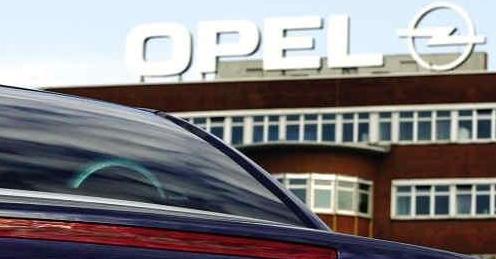 According to sources familiar with the French Ministry of Finance, the French government has advised Peugeot Citroën (PSA) to directly acquire the Opel depot under GM, a competitor that currently has a "cooperative relationship." "Le Monde" in the article pointed out that after the acquisition of Opel, PSA can re-establish a new business entity to counter competitors including the Volkswagen Group and other threats. Although this statement has been refuted by Opel, arguing that this is only a unilateral idea of ​​the French government, such “creativity†has caused considerable repercussions in the European car scene.
According to sources familiar with the French Ministry of Finance, the French government has advised Peugeot Citroën (PSA) to directly acquire the Opel depot under GM, a competitor that currently has a "cooperative relationship." "Le Monde" in the article pointed out that after the acquisition of Opel, PSA can re-establish a new business entity to counter competitors including the Volkswagen Group and other threats. Although this statement has been refuted by Opel, arguing that this is only a unilateral idea of ​​the French government, such “creativity†has caused considerable repercussions in the European car scene. Just come from the wind?
In February last year, the PSA Peugeot Citroen signed a cooperation agreement with General Motors and the two parties cooperated in the areas of procurement, development and logistics, and plans to save two billion U.S. dollars in costs over the next five years through joint procurement and the development of new vehicles. However, since the two sides announced their cooperation, disputes have continued to emerge, and the final cooperation case has led to changes in the situation due to the involvement of the French government.
On the other hand, many analysts believe that the current cooperation between the Peugeot Citroen Group and the General Motors Group has undergone considerable changes under the intervention of the French government, from the cooperation of the original large- and medium-sized car models to that between small cars. Joint research and development, and originally intended to be produced and assembled by Opel's factory in Germany, but also to be carried out in the production base of PSA Peugeot Citroën Group. As a whole, the dominant power has been almost obtained by PSA Group. General Group concedes all Opel's rights and interests. It also seems to have revealed some clues. Although the French government's statement is not true, it should not be just a matter of fact.
GM emphasizes that there is no intention to sell Opel
From the beginning of the news, GM repeatedly stressed that there is no intention to sell Opel. On the 10th, General Motors Vice Chairman and Chairman of the Opel Board of Supervisors Steve Gewsky said that GM does not intend to sell Opel. At the 2013 North American International Auto Show just opened on the 14th, General Motors CEO Dan Ixon once again stated: "Opel will not be sold or given up."
Opel Automobile suffered losses for many consecutive years due to the unfavorable factors such as Europe's economic downturn and overcapacity. Earlier, it planned to sell its assets to raise funds for repayment of the company's general-purpose loans. Although GM’s management has repeatedly stated that it will not sell Opel, GM actually hopes to move its heavily indebted Opel out of its business. Selling Opel to GM is undoubtedly a heavy burden on the capital side.
GM originally intended to use the Opel brand to develop the European market, but it was unsuccessful because it did not understand the European market. Since the 2008 financial crisis, the sales volume in the US domestic market has declined, and GM has repeatedly put Opel on the agenda because of its inability to operate Opel. From the analysis of the current market environment, GM hopes to concentrate its efforts on the US and Chinese markets, and to give up the European market that does not know when it will be able to recover. It is also a good idea to sell Opel.
In terms of products and technology, although Buick and the Chevrolet brand have some relationship with Opel, from the perspective of the general sales of Saab in the past, there was no specific adverse impact on the GM Group’s own product line. All that was needed was a time transition. And perfect.
imaginary
With Opel, PSA can be hard hit in China by the two brands Peugeot and Citroën under the PSA Group. In 2012, the European market slumped by 16.5%, and the total global sales of the two brands also decreased from 3.55 million in 2011 to 2.97 million. Vehicles, apparently under the impact of the European debt crisis, have already faced serious challenges. In 2012, the PSA Group was forced not only to close factories, but even to sell its corporate headquarters located in the elite area of ​​Paris to raise funds.
Globally, the original market share has been continuously eroded. The US and European markets have been declining. Although the Chinese market has grown, it is far behind the rival Volkswagen Group. The reason is that the product line is thin and the technical advantages are not obvious. The lack of popularity of vehicle models in the Chinese market is the reason for the rapid development of PSA.
The Opel brand, although tepid in sales in the Chinese market, has a good reputation in terms of product technology and quality. On the other hand, from the models, the ubiquitous brand Buick, which was once not taken seriously by GM, has almost disappeared in the United States, but it has made a beautiful stand in China, which is based on the development of the Opel platform, Yinglang, Regal, Cruze. There are inseparable relationships among other models. If PSA can successfully acquire Opel, it is believed that Opel product R&D capability and technical support will have a positive effect on PSA Peugeot Citroen.
JIANGYIN CHUANGJIA ELECTRICAL CO.,LTD , https://www.siliconsteelcore.com